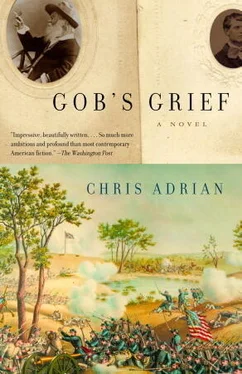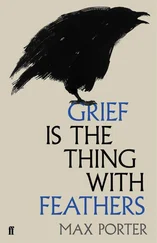“Where are we going?” Maci asked.
“Upstairs,” Tennie whispered. On the second floor, Tennie led her to a bedroom. She opened the creaking door very slowly, and after she had turned up the gas, touched Maci on the hand and said, “I thought you would like to see it.”
“Where are you going?” Maci asked, as Tennie left. Maci would have followed, but as soon as the light came up she recognized that this room belonged to her brother’s friend. She had confessed her stupid conceit late one night in Tennie’s Turkish corner, had unfolded Rob’s portrait of Private Vanderbilt while Tennie praised the art and the man. “He’s a big handsome beast,” she’d said, and they’d worked each other into sentimental tears for the lover Maci never had. Maci had been deeply ashamed the next day, and because Tennie had not ever spoken of it except to ask her if her friend Dr. Fie was not the same beastly size as Private Vanderbilt, Maci figured she’d forgotten.
Maci explored the room quietly, after briefly acknowledging to herself that she ought just to leave without disturbing a thing. It was as he must have left it years before, except his uniform was folded on the bed. There were a few pictures on the wall, big oil paintings of steamers, portraits of his father’s property. She opened a wardrobe to look at his clothes, oversized sack coats and shirts into whose sleeves she imagined she could easily fit her whole leg. When Maci lay down on his bed, her head found something hard under the pillow: a Bible. She put her face on the uniform, thinking to discover his secret, personal odor in it. But it had been too long since he’d worn it, and now his uniform smelled utterly blank. With her face in his shirt she considered how it was very bad, what she’d done, so grossly assuming that they might have been friends, and imagining him her husband in various domestic scenes. She was embarrassed for herself, to be sneaking in a stranger’s house, sniffing at a stranger’s clothes. And she was embarrassed because, lying here at last in Private Vanderbilt’s abandoned bed, as close as she would ever get to him in this life, she felt very little. In fact, she felt nothing at all, not love, not grief, not desire, just a great empty space where a ghost did not live, where there was nobody and nothing, after all.
Do you remember the day our mother died? Do you remember how it was beautiful, bright, and warm after two cold days of rain? It put me in mind of Easter, because I had never seen it rain on Easter, or fail to rain on Good Friday. There was something that I wanted to say to you, then, but like you I was dumb in my mourning. I wanted to tell you that I was so sad I felt as if I might be happy, or in love, simply because such powerful feelings can appear the same to the naive. I was mighty with grief, and I thought I should be empowered by it. I thought my hands should shine with a yellow light, and that should I reach out to touch our mother on the head, I would call her back from the place she’d gone. I felt so very powerful. Later I thought, Fool, you’ve never been more powerless in your life. And it seemed so stupid, to think I could have called Mother back to life merely with the strength of my sadness. But Sister, the ridiculous fallacy is to think that grief cannot bring us back. You must believe me when I say that it certainly can. If only you grieved more and better, we would be back with you now. If only you did not forget us, we could return to you.
Maci tended to arrange all the Claflins but Tennie by their bad habits, and in her mind she often referred to them by their chiefest sins instead of their names. So big, hairy Malden Claflin was Gluttony. Sinister, one-eyed Buck, who’d come pawing at Maci one night in her bedroom, and was dealt a black eye by her left hand, was Avarice, because his greed was even more prominent a feature in him than his lechery. Miss Utica, drunk and jealous of her sisters every hour of the day and night, was Envy. Worst of all of them was Anna Claflin, Mrs. Woodhull’s demonic mother, a lady who embodied a sin Maci had no name for. It involved a quality of being murderous in intent if not in action, of being a contemptible liar and a relentless hater, and of trying to own every person around you, even strangers.
“How do you rise, with such weighty hangers-on?” Maci had asked Mrs. Woodhull, because she did not understand how she could have accomplished all she had with such a persecutory chorus always trailing after her.
“My family is my strength,” Mrs. Woodhull replied confidently, but they almost destroyed her in May, when Anna Claflin swore out a warrant against Colonel Blood, whom she hated because he had appropriated a portion of her daughter’s love that Anna thought was due all to her. May was anniversary month, when a person could not open a paper without seeing accounts of the annual meetings of a half-dozen societies. Societies bent on reforming or deforming the nation; associations for the advancement of the street urchin; bands of veterans; amateur devotees of the botanical sciences; the River Pirates’ Orphans’ Benevolent Circle — everyone met in May. Mrs. Woodhull had a bright moment at the convention of the National Woman Suffrage Association at Apollo Hall, but even as she was speaking her mother was slouching down to Essex Market police court. There Anna swore out her warrant accusing Colonel Blood of beating her and threatening to kill her with an iron dog similar to the one used to murder the distinguished Mr. Nathan nearly a year before. She hinted that it was very possible, to her mind, that Colonel Blood, not Mr. Nathan’s son, was the still-at-large fiend who had gleefully bludgeoned that esteemed man to death.
“You awful creature!” Mrs. Woodhull shouted at her mother, after the trial was over, after her magnificent speech had been eclipsed in every New York paper by the misleading fact that she had two husbands living in her house. “You false thing!” Mrs. Woodhull put her face in Maci’s shoulder and cried, and Maci brought her arms up to embrace her. Anna Claflin was shrieking curses, but Maci barely heard them. She felt suddenly transported out of the elegant parlor, out of the beautiful house, and up into the sky, because greatness had chosen her arms in which to weep.
Anna and Buck were ejected from the house on Thirty-eighth Street, but they came back in June, recalled by some familial gravity that baffled Maci. By then Maci had other worries. Ever since Anna’s trial, it had become fashionable to insult Mrs. Woodhull, and every day, all over the country, some editor would hop on the slander-cart and write an editorial that called her immoral for sheltering her broken-down former husband in her mansion. The most humiliating attacks came from Catharine Beecher who claimed that Mrs. Woodhull was the pinnacle of five thousand years of accumulating indecency, and from Beecher’s sister Mrs. Stowe, who caricatured Mrs. Woodhull in the pages of The Christian Union. In Mrs. Stowe’s frankly stupid serial novel, Victoria Woodhull was a carousing lady called Audacia Dangereyes, who owned a paper called The Virago , who swore and had multiple husbands, and in whose wake Free Love circulated like a stink.
“This will stop their fat mouths,” Mrs. Woodhull said as she and Maci worked on a letter to the Times , a veiled threat to expose Henry Beecher as an adulterer. Because I am a woman , Maci wrote while Mrs. Woodhull stood with a hand resting on her shoulder, and because I conscientiously hold opinions somewhat different from the self-elected orthodoxy which men find their pride in supporting, self-elected orthodoxy assails me, vilifies me, and endeavors to cover my life with ridicule and dishonor. This has been particularly the case in reference to certain law-proceedings into which I was recently drawn by the weakness of one very near, and provoked by other relatives.
Читать дальше












